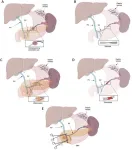(Press-News.org) New research at the University of Illinois Chicago is testing whether digital tools can help predict which patients with depression will benefit from specific treatments and help deliver those treatments to them on demand.
Two new grants awarding over $10 million to UIC will help Dr. Jun Ma and colleagues in the College of Medicine investigate the use of a smartphone app, an AI voice assistant and other technologies to diagnose and treat depression.
The researchers hope these tools will both broaden access to psychiatric care and help realize the promise of precision psychiatry, a paradigm of medicine where health care is more personalized, predictive and preventive.
“We want to use new digital assessment tools to better monitor and predict the disease trajectory and treatment response of people with depression,” said Ma, the Beth Fowler Vitoux and George Vitoux Distinguished Professor at UIC. “Then we can provide patients with the kind of precision treatment that can work for them now, instead of waiting for weeks, months or even a year to see how they respond, and also use new digital tools to deliver proven therapies at scale.”
Treating different types of depression
Psychiatrists know there is no one-size-fits-all treatment for depression. In fact, evidence suggests the disorder may be comprised of several clinical subtypes.
Recently, Ma and researchers at Stanford University published a study in Nature Medicine that identified six depression biotypes using brain scans and machine learning. Some of these subtypes were more responsive to antidepressant medication, while others benefitted more from therapy.
With a grant to Stanford and UIC from the National Institute of Mental Health’s precision medicine in psychiatry initiative, Ma and her collaborators will build on these findings by adding new diagnostic tools to the brain-scan data and launching a clinical trial. Of the grant, $6.8 million will go to UIC researchers.
The study will use BiAffect, a smartphone app created by UIC researchers Dr. Alex Leow and Peter Nelson that measures cognitive health through changes in typing behavior during everyday tasks such as texting friends or posting on social media.
With BiAffect, researchers will be able to assess patients between clinic visits to generate new information that may help identify additional subtypes of depression, said UI Center on Depression and Resilience Professor of Psychiatry Dr. Olusola Ajilore.
“There’s an increasing understanding of the importance of how we think and how alterations in how we think play a role in mood disorders,” Ajilore said. “For a long time, we’ve just focused on the emotional part of mood disorders — feeling depressed, feeling manic — but there’s a cognitive part that’s also really important.”
Based on this new information, researchers will sort study participants into groups who have cognitive dysfunction and those who don’t, then give them either an antidepressant or an antidepressant plus a blood-pressure drug currently used for ADHD and PTSD.
“The grand goal of the study is to stratify patients so that we can better tailor treatments for them, rather than treating everybody with depression and putting them all in the same bucket,” Ajilore said.
A fully digital intervention for depression and obesity
Among middle-age and older adults, depression often coincides with obesity, particularly in Black and Latino people. Ma and her team in the Vitoux Program on Aging and Prevention at UIC previously showed that combining behavioral interventions for the two conditions could be more effective than addressing them one at a time.
A second grant of $4 million from the National Institute on Aging will fund a new trial that uses an AI virtual coach to provide behavioral therapy for depression, paired with a video-based anti-obesity program to create a fully digital intervention for patients.
Lumen, an app on the Amazon Alexa platform, guides patients through problem-solving therapy. In a pilot study, the app intervention was associated with reduced depression and anxiety in patients. There were especially promising results in women and non-white patients.
The new study will primarily enroll Black and Latino adults between the ages of 50 and 74 — groups that generally have poor access to psychiatric treatment. As with the other study, researchers will assess which individuals and groups respond best to the paired interventions to further customize treatments to patients in the future.
“By using these latest digital interventions to help deliver care at scale, with a particular emphasis on medically underserved populations, we can help address accessibility and also deliver the right treatment to the right patient at the right time,” Ma said. “And this aligns with the mission of the Vitoux Program.”
Written by Rob Mitchum
END
Apps and AI could help personalize depression diagnosis and treatment
2024-07-16
ELSE PRESS RELEASES FROM THIS DATE:
Researchers create new template of the human brain
2024-07-16
The human brain is responsible for critical functions, including perception, memory, language, thinking, consciousness, and emotions.
To understand how the brain works, scientists often use neuroimaging to record participants’ brain activity when the brain is performing a task or at rest. Brain functions are systematically organized on the cerebral cortex, the outer layer of the human brain. Researchers often use what is called a "cortical surface model" to analyze neuroimaging data and study the functional organization of the ...
Study identifies protein that helps COVID-19 virus evade immune system
2024-07-16
An article published in the journal Cell describes a study that enabled a group of researchers to discover how SARS-CoV-2 evades the cytotoxic immune response by identifying a protein called ORF6 that is a key factor in this mechanism.
The cytotoxic immune response involves T-lymphocytes that kill pathogens when they recognize cells bearing a specific antigen while sparing neighboring uninfected cells.
The study was led by Wilfredo Garcia-Beltran and Julie Boucau, research scientists at the Ragon ...
Scientists use machine learning to predict diversity of tree species in forests
2024-07-16
A collaborative team of researchers led by Ben Weinstein of the University of Florida, Oregon, US, used machine learning to generate highly detailed maps of over 100 million individual trees from 24 sites across the U.S., publishing their findings July 16th in the open-access journal PLOS Biology. These maps provide information about individual tree species and conditions, which can greatly aid conservation efforts and other ecological projects.
Ecologists have long collected data on tree species to better understand a forest’s unique ecosystem. Historically, this has been done by surveying small plots of land and extrapolating those findings, though this cannot account for ...
Machine learning helps define new subtypes of Parkinson’s disease
2024-07-16
Researchers at Weill Cornell Medicine have used machine learning to define three subtypes of Parkinson’s disease based on the pace at which the disease progresses. In addition to having the potential to become an important diagnostic and prognostic tool, these subtypes are marked by distinct driver genes. If validated, these markers could also suggest ways the subtypes can be targeted with new and existing drugs.
The research was published on July 10 in npj Digital Medicine.
“Parkinson’s disease is highly heterogeneous, which means that ...
Weight loss influences risky decisions in obesity
2024-07-16
People who are severely overweight (obese) not only exhibit altered risk behavior, but also changes in their metabolism and psyche. It was previously assumed that severely obese people are more impulsive and show an increased willingness to take a risk. Scientists from the DZD partner German Institute of Human Nutrition Potsdam-Rehbrücke (DIfE) have now investigated whether massive weight loss leads to an improvement in metabolic and psychological states and whether decision-making is improved. The results were published in the journal 'Clinical Nutrition'.
Being overweight can cause metabolism to slip
Our behavior depends on many factors. ...
EurekAlert! Travel Awards recognize early-career science journalists in Eastern Europe for the first time
2024-07-16
The winners of the 2024 EurekAlert! Travel Awards are Pavla Hubálková, a Czech science journalist at WIRED.CZ, and Iris Duțescu, a Romanian freelance science journalist.
An independent panel of three judges with regional science journalism expertise selected the winners. Both awardees will receive travel support from EurekAlert! to attend the 2025 Annual Meeting of the American Association for the Advancement of Science (AAAS) in Boston, Mass., where they will have opportunities to cover the latest scientific research and make connections with scientists ...
Etiologies of splenic venous hypertension
2024-07-16
Splenic venous hypertension (SVH), also known as left-sided portal hypertension, is a rare condition characterized by upper gastrointestinal (GI) bleeding in the absence of liver disease. This condition arises due to increased pressure in the splenic vein (SV), causing blood to drain through the short gastric veins to the stomach, leading to the dilation of submucosal structures and the formation of gastric varices. Unlike traditional portal venous hypertension (PVH), SVH does not involve elevated pressures in the main portal vein and is primarily an extrahepatic condition. Diagnosing SVH requires ...
Breakthrough in quantum microscopy: Stuttgart researchers are making electrons visible in slow motion
2024-07-16
"With the method we developed, we can make things visible that no one has seen before," says Prof. Sebastian Loth, Managing Director of the Institute for Functional Matter and Quantum Technologies (FMQ) at the University of Stuttgart. "This makes it possible to settle questions about the movement of electrons in solids that have been unanswered since the 1980s." However, the findings of Loth's group are also of very practical significance for the development of new materials.
Tiny changes with macroscopic consequences
In ...
E-sales of a wild bat sold as décor threaten species
2024-07-16
A fiery orange bat, its wings folded and tiny teeth forever bared on its fuzzy face, is mounted inside a 6-inch, black coffin. Its retail price: $59. Or, for $140, you can get one framed with its black and orange wings spread, deliverable in two days.
Despite declining numbers in the wild, hundreds of specimens like this of Kerivoula picta—or painted woolly bat—are being sold on Etsy, eBay and Amazon as jewelry, Halloween decorations, and jarred curios.
A study published July 9 in the European Journal of Wildlife Research found “abundant evidence that ...
Social media polls deliberately skew political realities of 2016, 2020 US presidential elections, finds research team led by UMass Amherst
2024-07-16
AMHERST, Mass. – Informal political polls conducted on X/Twitter during both the 2016 and 2020 U.S. presidential elections were significantly skewed by questionable votes, many of which may have been purchased from troll farms. This conclusion, reached by a team of scientists led by Przemyslaw (Przemek) Grabowicz, research assistant professor at the University of Massachusetts Amherst, shows that X/Twitter’s poll system deliberately reports biased public vote counts. On average, the results of such questionable polls favored Donald Trump over Joe Biden, 58% to 42% in a head-to-head comparison, during 2020.
The team additionally found that ...






